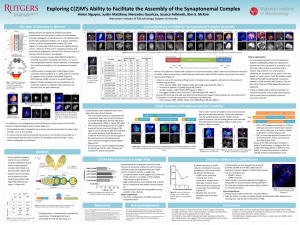Nguyen, Helen: Exploring C(2)M’s Ability to Facilitate the Assembly of the Synaptonemal Complex
Title: Exploring C(2)M’s Ability to Facilitate the Assembly of the Synaptonemal Complex
Name: Helen Nguyen
Major: Genetics
School affiliation: School of Arts and Sciences
Programs: Human Genetics Institute of New Jersey MacMillan Cancer Genetics Summer Undergraduate Research Fellowship (HGI-SURF)
Other contributors: Justin Matthew, Mercedes Gyuricza, Jessica Fellmeth, Kim S. McKim
Abstract: Meiosis is the process by which sexually reproducing diploid organisms make haploid gametes. The C(2)M cohesin complex is one of two independent meiotic cohesin pathways that has been shown to regulate homologous chromosome cohesion in Drosophila by facilitating the assembly of the synaptonemal complex. Although meiosis specific complexes have been identified in many organisms, the function of them is still not well understood. We hypothesized that mutations, specifically those in the C- and N-termini, will prevent the ring from closing by preventing interactions with the other ring components (SMC1/3). Through mutant analysis, we show that there are key residues that may interact with the SMC proteins, and the lack of proper formation of SC in these mutants suggests that they are critical for SC function. Given our results in which several mutations in conserved C(2)M residues were found that prevented SC from forming normally but still colocalize to centromeres and occasionally in foci along chromosome arms, it suggests that C(2)M may require a cohesin ring-structure to perform meiosis-specific functions such as the formation of SC. Complementation testing also suggests that C(2)M acts as a single subunit in rings that do not interact with each other.
